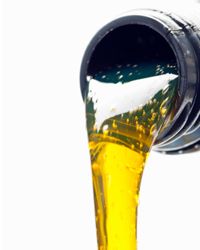Of course, this advice is all for naught if you're not using the right oil in the first place, so your safest bet is to find out what type of oil your car's manufacturer recommends. Your car will perform best using certain types of oil, and if your car is new and still has a manufacturer's warranty, the engine coverage might be voided if you stray from your manufacturer's specifications.
Your car's owner's manual will specify if you should use synthetic or mineral-based oils. If you have a car with a high-performance engine, it's especially important to use a designated premium oil to prevent debris buildup. But beyond the oil's source, there are other qualities that affect engine performance, and it's wise to trust the people who designed and engineered your car.
Viscosity is the next most important factor. As we mentioned earlier, it's what is meant when discussing oil's "weight," but it's slightly more complicated than that. Different types of engines are built with different tolerances. Put simply, tolerance is a measurement of how the moving metal parts interact as the engine churns. A tight (or low) tolerance generally means the engine's parts mesh very closely together and there isn't much margin for error. This is particularly important with big, expensive high-performance engines. Less-expensive engines, common in small or economy cars, might have a slightly higher tolerance. So, what does this mean for motor oil? Well, the oil has to fit between all those meshing parts to prevent extremely harmful metal-on-metal contact. A viscosity designation will tell you (using an industry-standardized rating system) how thick the oil is and how well it flows (if it slips easily through the engine or forms a thicker, more clingy coating). Some oils are highly vulnerable to temperature changes; others are a bit hardier. But your owner's manual will specify what oils you should use to help your car perform best in different seasons and different weather conditions.
Also, manufacturers market their oils with specific additives to customize their products for different types of cars, varying weather conditions and different driving purposes -- like high-mileage cars, stop-and-go commuting or even racing applications. These oil additives include conditioners that lubricate the seals to prevent passage of debris, and detergents that help clean. Detergents are there primarily to prevent deposits. They'll also inhibit rust and corrosion inside your car's engine, and may help dissolve existing buildup before it becomes a problem. Dispersants break down buildup and suspend the particles in the oil so, as the oil flows, the contaminants can be caught by the filter. But some experts warn that oil additives might not be as helpful as promised. In fact, they tend to have a limited lifespan that won't really be beneficial beyond the oil change interval, anyway.
For more information about motor oil and other ways to keep your car's engine healthy, follow the links on the next page.





